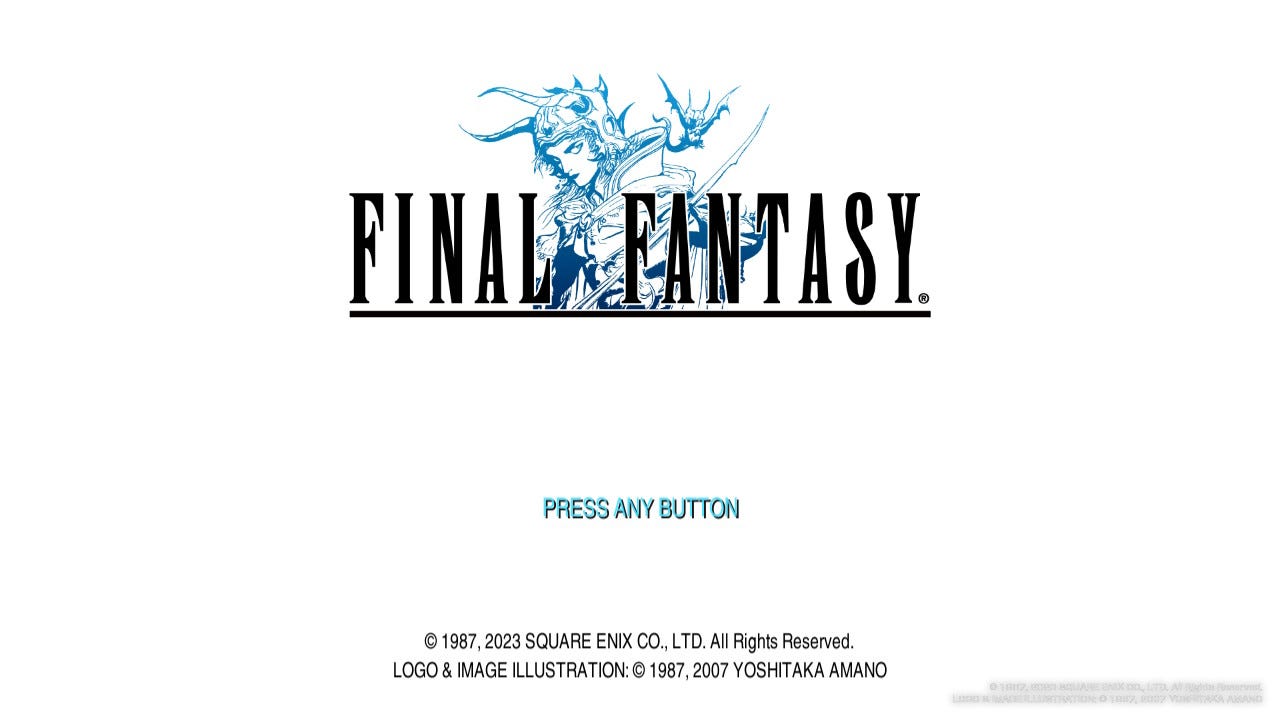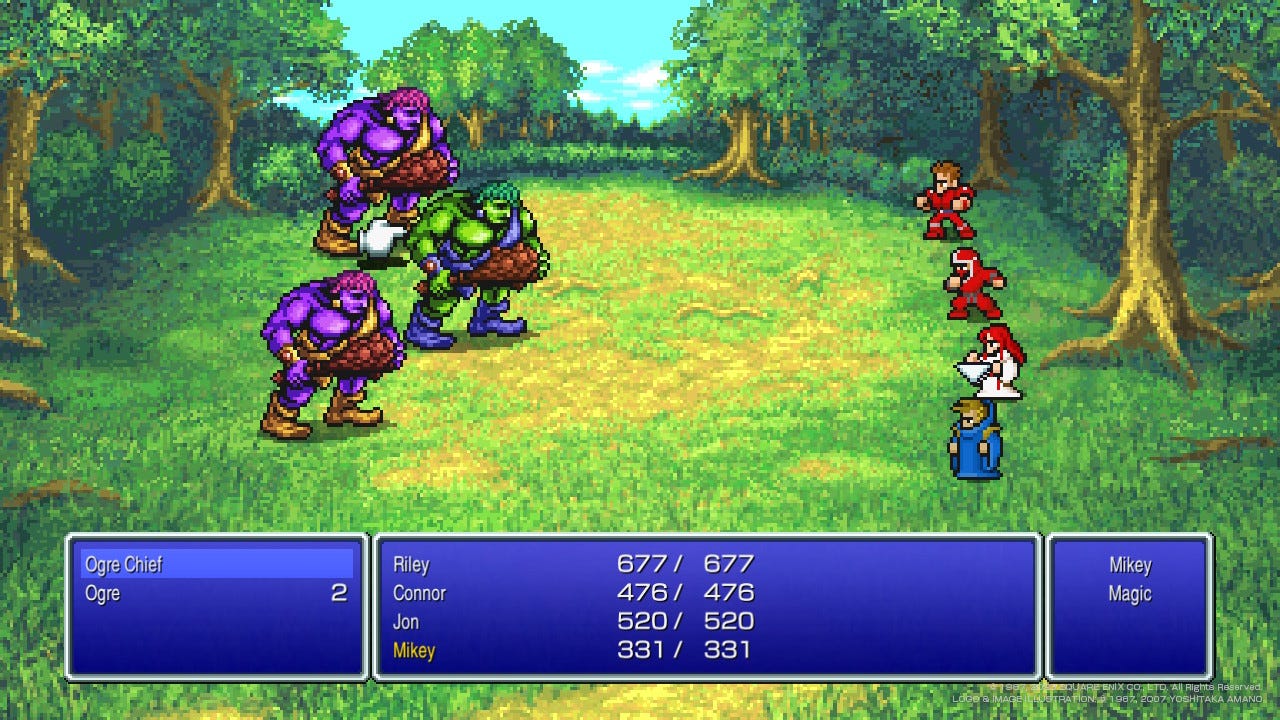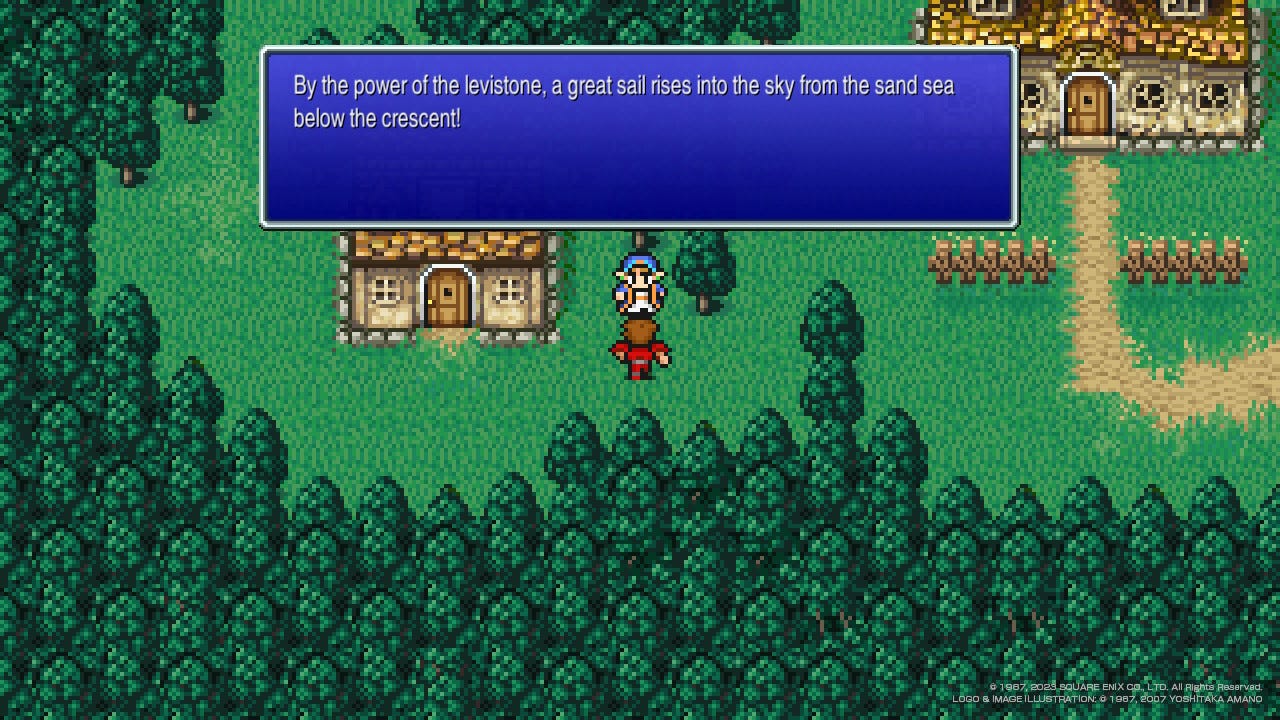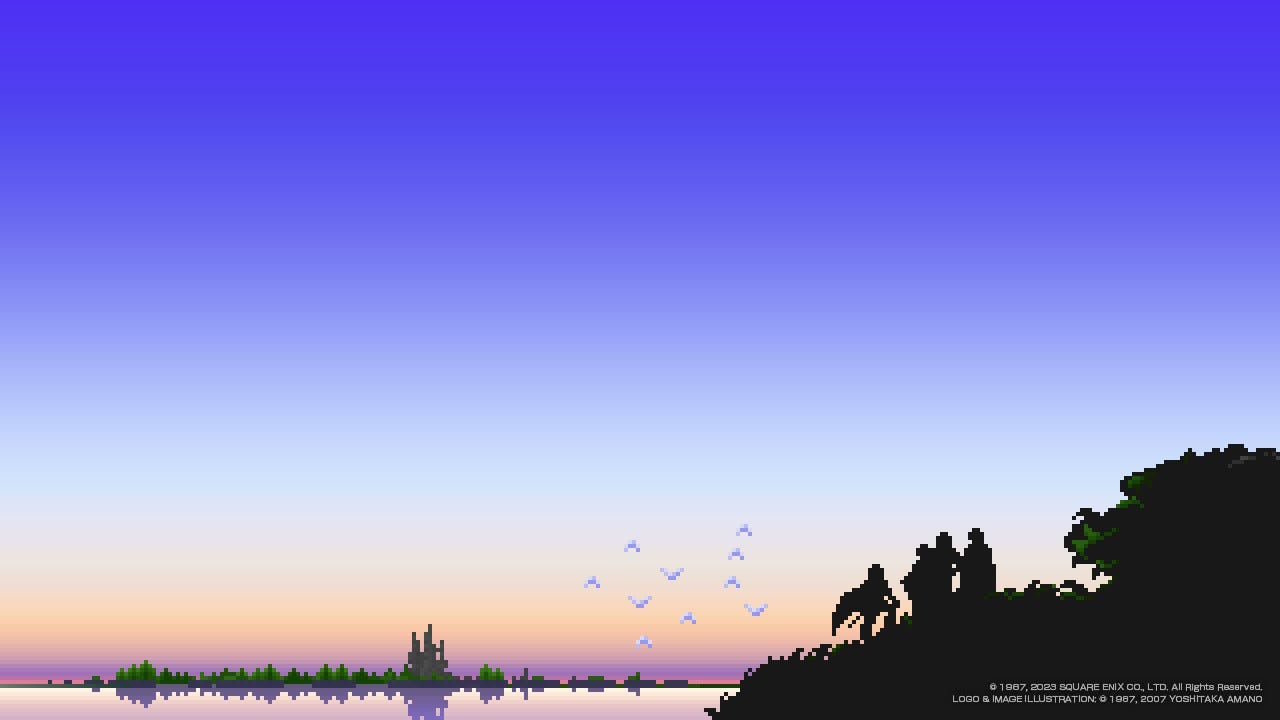Final Fantasy is the game that started this whole series. Originally released by Square to Japanese customers in 1987, the game would arrive in the States 3 years later via Nintendo of America. It would later spawn 15 more sequels, some of which would have their own spinoffs, sequels, and remakes. Not just confined to the Nintendo Entertainment System, Final Fantasy 1 has since been released on the original PlayStation, the Japan exclusive WonderSwan, the Game Boy Advance, and the PSP. In 2024, we have the Pixel Remaster series, comprised of remasters of the first six Final Fantasy installments, which is how I played this game. While the Pixel Remaster’s enhancements help, underneath the fresh coat of paint we still have a 37-year-old video game. By today’s standards, Final Fantasy is pretty basic: the story is light, dialogue is limited, and the battle system lacks complexity. I wouldn’t call it bad, but I would definitely call it dated.
Nowadays, the Final Fantasy series has a reputation for grandiose, sometimes overly complicated storytelling, but this initial entry’s narrative is very barebones. There are four Warriors of Light, prophesized to restore their crystals to full power and save the world from chaos. Modern Final Fantasy games star their own cast of predefined characters, but in Final Fantasy 1 the player makes their own party of whatever four classes they desire. With four blank slates, there aren’t any complicated character relationships to observe or ethical dilemmas to ponder: we have a simple good versus evil story. This simplicity isn’t a bad thing — Final Fantasy 7: Remake does its best to be as convoluted as possible (I seriously have no idea what happened in the final chapter of that game) — and I can appreciate a basic, no-frills tale of light and dark.
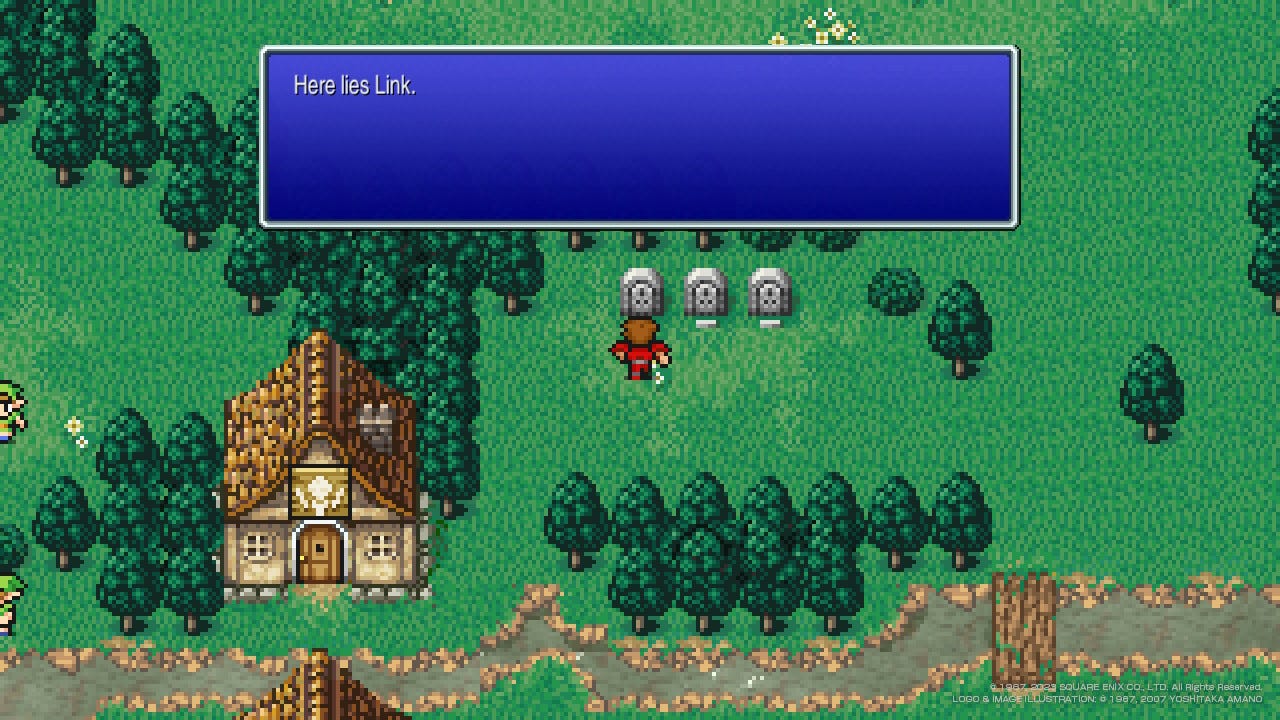
This original entry is quite charming and borrows more from traditional fantasy than later installments would. You’ll visit dwarves in a mountain who do a goofy little jump animation when spoken to. You’ll venture underwater to help mermaids in trouble with a kraken. You’ll find a gravestone belonging to a person named “Link” in a town full of elves. One of the strongest weapons in the game? Excalibur. My favorite quirk is the tool used to translate the language of the Lufenians: the Rosetta Stone. It’s a very lighthearted, goofy adventure.
There are many places where Final Fantasy shows its age, but the biggest one is in its combat. The player selects an action for each of their four party members, then both the player and enemy parties will attack based on certain character attributes. Characters will attempt to attack/buff/debuff their desired target and will pivot to another if their target has died. Later Final Fantasy games would jazz up their combat via the ATB and CTB systems, but Final Fantasy 1 is pure turn-based combat, devoid of any style. There are no gimmicks here.
Most combat scenarios begin with random encounters. Nearly every modern RPG I can think of has done away with random encounters, and for good reason: random encounters blow. I much prefer seeing physical enemies on screen and choosing whether or not to fight them. Thankfully, the Pixel Remaster band-aids this issue with a random encounter toggle, but I’ll talk about Pixel Remaster improvements later.
My least favorite aspect of combat is how magic casting is handled: spells are sorted into levels based on their strength, and each mage has a certain amount of MP per spell level. It can be kind of annoying if you’re unable to cast a low-level buff like Temper but are still able to resurrect dead teammates. I much prefer having a pool of Magic Points and each spell having a cost, and I ended up avoiding magic in random enemy encounters so I would have magic during boss fights.
Combine the rather basic turn-based combat with random encounters that ensure you’ll be fighting at the worst possible times, and you have a combat system I don’t really enjoy. Regular combat encounters don’t really have any strategy to employ, and I eventually realized the most efficient strategy was to tap Y at the beginning of a fight to auto-battle. The boss fights can be fun since you have to use an entire arsenal of skills to buff your team, debuff the enemy, and do as much damage as possible, but boss fights are obviously significantly less frequent than random encounters. I get that this is a game from 1987, but it doesn’t really change the fact that the gameplay is kind of lame in 2024.
There’s the occasional vagueness of quest design that can put a damper on your progression. One of my least favorite Zelda entries is the original NES game due to how opaque the game can be when it comes to guiding you to your next destination. Final Fantasy 1 isn’t quite as bad about this, but at times I would need to consult a guide and when I read the solution, I would wonder how I would have progressed on my own. For example, to progress to the northern continent, the player needs to unlock the Airship. To do this, they need to acquire the Levistone from the Ice Cavern, then venture to a wide-open desert in the south. There’s a singular hint in the game that tells you to do this, and it’s in Elfheim of all places, which you likely already visited ages ago and thus have already forgotten about. I haven’t played the original NES version (I was not yet born when it released) so maybe there was a mention of the Levistone’s purpose in the instruction manual, but in 2024 the only way I knew what to do was to use an online guide.
The best features of this Pixel Remaster are the quality-of-life features that make this 37-year-old video game a bit more manageable in the modern day. There’s the aforementioned random encounter switch, which is great for exploring dungeons when you want to grab the last few chests you’ve missed without attracting trash mobs. You can tap the Y button to auto-battle, allowing you to fast forward through meaningless fights if you need to grind EXP a little. You can also just straight up boost the amount of EXP and Gil you get from killing enemies, which is awesome if you want to expedite your leveling or maybe solo the initial Chaos fight. (Is that possible?)
As the Pixel Remaster name implies, there’s an updated visual style to the game, and I think it looks really good. The end result ends up looking like a widescreen SNES remake with extra polish. When you’re flying in the airship, the world map transforms from a 2D overhead view to a 3D view with a visible horizon, pixel art still in place, and it looks great, especially the lighting from the sun on the ocean and islands. Character sprites have more detail now than they did in their 8-bit forms, but still look faithful to the original designs, almost like someone turned the quality preset from Low to High. There’s a new soundtrack that’s much easier on the ears than the original (which is also still present if you want to listen to it) as well as a new localization. The only missing feature I would have liked to have would be the ability to use the NES graphics, but I probably would’ve only used them for novelty’s sake, so this is no real loss. I think it’s awesome that even with tiny pixel graphics the Final Fantasy series manages to uphold its reputation of cutting-edge visuals.
I’ve kind of made this original Final Fantasy sound like a bit of a mixed bag, and that’s because it is. It’s a very charming little game and it’s where this groundbreaking series originated, but it’s also kind of a slog to play, despite its short length. I wouldn’t say it was a waste of my time (it made good company during the lackluster Dodgers-Mets NLCS), but I don’t think it’s an entry I’ll want to revisit anytime soon. I mostly admire it for its historical significance: this is the game that saved Square and birthed one of the most iconic video game franchises. The question remaining: who should play this game?
For most people, I think their time is better spent playing a different RPG. Those looking for an RPG with a compelling story would be better off looking elsewhere, as would those looking for an RPG with interesting combat. I’ve lauded the game’s charm this whole time, but there are plenty of RPGs with better stories and better combat that are also very charming: Dragon Quest XI comes to mind and it’s available on the same platforms as the Pixel Remaster. I think Final Fantasy diehards who have yet to experience this entry or simply want to revisit where the series began will, of course, find value in playing this game, but for the majority of people you might want to try a different Final Fantasy.

